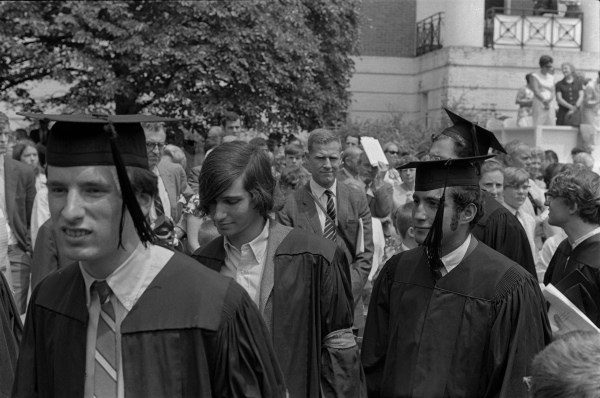Jim Steinman : Amherst Student
by Angie Winterbottom
During his days as an undergraduate at Amherst College, Jim Steinman was involved with several theatrical productions, college bands, campus radio, and was an active writer for the Arts pages in the student newspaper the "Amherst Student". Throughout 1968, he was Arts Editor for the publication.
Thanks to Amherst's Digital Collections, we have managed to gather together many old articles — both written by Jim and sometimes about him — so we may take a peek into Jim's college days through 1967-68 and see some of his thoughts upon various subjects, events, and entertainment at the time - and also learn a little about the various theatrical and musical projects / bands he was involved in. The same names crop up time and again in local theatre and music, many of these people ended up having a role in The Dream Engine. The production of Brecht's "A Man's A Man" with music by Jim Steinman and the Leaves Of Green — several of those same band members later became members of Sundance and are the musicians you hear on The Dream Engine '69 recordings. And, it will probably come as no surprise to Jim Steinman fans to read that he was directing theatre plays before he was composing music. That he would approach film reviews from the perspective of what the director was trying to achieve. That he would review a Sly And The Family Stone album in terms of film direction. And just how influential The Doors and Brecht & Weill were on him.
“The Dream Engine” is a culmination of experiences and an outpouring of a generation - but for people who aren't part of that generation, that culture, that time — it's a difficult piece to grasp. This background knowledge may help as a bridge to unpacking “The Dream Engine”.
There are so many contemporary events and movements touched on in this newspaper. Early 1967 when Jim writes about the New York Be-In, there's the hippie movement. There were numerous army recruitment notices around this time for the war in Vietnam, including events where they would come to the college to recruit. Rick Weinhaus (at the time, bassist for Leaves Of Green and Sundance) spearheaded a campaign to get the recruiters off campus, as it seemed inappropriate on the grounds of a liberal arts college. Jim was on the list of signatures. The recruitment gradually pushes harder and harder, and then the draft commences. There are reports of violent clashes at anti-war protests. There was also the civil rights movement in full swing, April 1968, campus is sad and angry at the death of Dr Martin Luther King Jr, which turns to sorrow and mourning in the days to come... and there's more violence with race riots. Language — you'll notice in these articles, people are happy to talk about "Negro music" and so on, and that seems to be plain ordinary usage. But "obscene language" (e.g. cock, fuck, shit, cunt) was a big part of why Michael McClure's play The Beard was controversial. (Though the oral sex might have been a bigger factor!) There's also the now-legendary recreational drug use of the 1960s. And Jim's endless pursuit of media that shakes people up, unsettles them. All of this together is rolled up into The Dream Engine.
In 2013, Jim Steinman returned to Amherst College to be awarded an honorary doctorate. He had a copy of his Amherst Student article "revolution...rock...the doors...jumping jack flash...nietzsche...mayor daley's armpit" projected, and printed out for everyone. To quote Jim:
"I picked that piece because that exact date (whatever it was, October 1968), when that article was printed, that was when I felt I was born, really. I became the persona that I am. It required that accomplishment."
"Actually, I wonder, as I've never seen the Amherst Student since then, are there any articles like this in the Amherst Student now? (Laughter) I'm serious! I mean, there were no computers at the time, so that was a big deal to me, the graphics, even, of the article, the layout. I was the arts editor and that was my first big piece. It was really a conglomeration of observations on rock and roll and politics, but, I think, after I wrote it, I read Frank Zappa's quote, which was: Rock and roll critics are people who can't write, writing about people who can't talk, for people who can't read. (Laughter) And I sort of figured, I don't know if I want to be a part of that, so I decided I should actually write some music."
